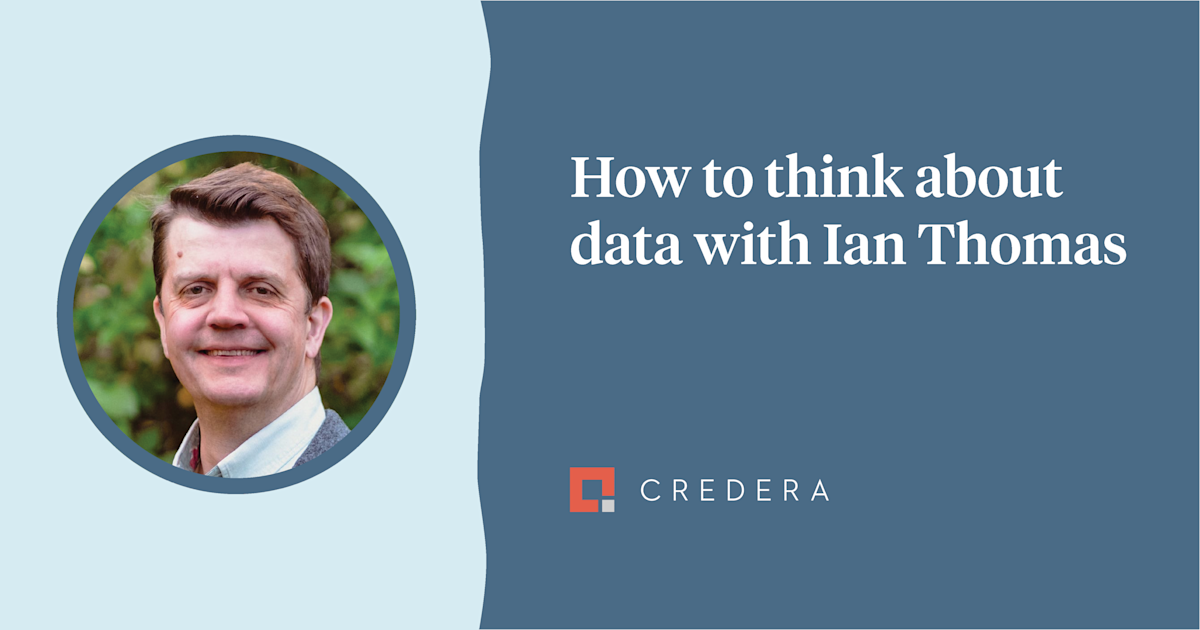
In July, we released our fifth episode of the Credera Podcast, where I talked to Ian Thomas, Chief Data Officer at Credera UK.
Ian offered our media & publishing audience new insights into the world of data, drawing from his years of experience in this field. We discussed the role of data in marketing transformation, data strategy in comms & media, privacy and personalisation and much more!
I’ve summarised a few of my favourite parts of the podcast in this blog post. You can listen to the podcast in full on Spotify, on Apple Podcasts, or watch the video on YouTube. Our next podcast episode will be out soon with another leader in the media industry. Contact us if you’d like to participate in a future episode of the Credera Podcast.
What work is Credera doing in the MarTech space?
The big thing that we’re doing here in the UK is helping clients with their MarTech deployment.
We often find ourselves talking to clients who have an existing MarTech platform that they don’t feel they’re getting great value from, because it’s not well connected to their data or to their delivery platforms. We also help those who want to update their master platform to really understand both the technology, the platform and the integration issues and build effective roadmaps for doing that.

Ian Thomas, Chief Data Officer at Credera UK
We have a lot of experience in assisting organisations with process and cultural change more broadly. That means managing change and helping to map those change processes into technology and value.
How would you explain data management to someone with minimal prior knowledge or experience?
I sometimes talk about data as cake. You can acquire cake in a number of different ways:
You can go and buy a cake from somebody who’s sourced all the ingredients, mixed them together, and used the recipe to make a delicious cake for you
You can buy the cake baking kit with all the ingredients measured out for you, and you can make a reasonably good cake yourself
You can source all the ingredients yourself and make a cake from scratch
Data in that analogy is the ingredients that you’re using to bake that cake. The ingredients are interesting on their own, but they don’t come to life until you bake them into a cake. And the cake in this example is the insights, analytics, reports, dashboards, and decision-making systems that you use data to drive.
The other important part of this way of thinking about data is that different people want to consume these ingredients in different ways:
Some people want to bake a cake themselves, like a data scientist who wants to really dig into data and create this perfect cake
Some just want to buy a cake from the shop, like a business user
It is important for every CDO to take into account who their constituents are and in what kind of ways they want to consume that data cake.
What are the key challenges in and around data?
There’s a lot of data. The problem of data scarcity has already been solved with cloud technologies that help you store vast quantities of data – and now you have to figure out what to do with it.
There are a couple of things that are really holding people back. One is that there’s lots of data silos in organisations. Not so many years ago, the standard playbook around data was to bring all data into a central location and manage it centrally �– as a service for the rest of the organisation. But this often caused a lot of internal resistance. Now, people are starting to talk about the ‘data mesh’ approach. This is where you have distributed ownership of data, but you create a foundation for people to share and leverage each other’s data.
Fair warning though, there isn’t a big gap between a ‘data mesh’ and a ‘data mess’! A lot of people look at the idea of a data mesh and see it as an excuse not to take the hard decisions about sharing data across the organisation.
Oftentimes, technology isn’t really the challenge. It’s the culture and the politics that hold organisations back. That is one of the most challenging aspects of changing how data is consumed within an organisation.
Taking all these volumes of data and creating products of value at the end of the organisational level is really important. And one of those main products is the idea of a ‘single view of the customer’.
Often, as we know, technology isn’t the challenge. It’s culture and the politics that can hold organisations back. That is one of the most challenging aspects of changing how data is consumed within an organisation. People feeling that they can take risks, as long as they are managing these risks and have a plan to learn from them, is super important. That allows you to have data work for you rather than the other way round.
How are your comms & media clients thinking about their data strategy? How are they executing on that?
When you’re talking to people about data strategy, they tend to think from a data management strategy. How can I manage and protect my data better? How can I make it more available across the organisation? How can I improve the quality of that data?
All those things are important. But you have to think creatively about the value that data can deliver against your company’s business strategy. Within the media business, a lot of that is driven by the shifting monetisation patterns of moving away from a hyper-dependence on ad revenues to a mixed revenue model. And that leads publishers to thinking about the first-party relationship they can build with their viewers or readers.
The web publishing industry in particular has become overdependent on data that they don’t own (i.e. Google and Facebook audience data). Now they’ve realised, you shouldn’t outsource the understanding of your audience to a third party. And you particularly shouldn’t outsource it to a third party that has their own interests around content and content distribution! Privacy changes are bringing old ideas around content back into fashion. Targeting and personalisation is not just about driving engagement, but also context and relevance.
How can media companies make it easier for their customers to choose how their data is used?
There’s been a lot of legislation in this area in the last few years. We’ve got GDPR in 2018 and CCPA in 2020. And both of those, in an effort to give consumers more control, created this unfortunate situation with cookie consent popups on publisher sites, or indeed any site. If you click through to the details of those consent forms, you’ll be asked to provide consent for multiple third-party advertising ecosystems, data providers, or service providers.
And the reason for that is because GDPR doesn’t allow you to retroactively gain that consent. If a publisher wants to send data to a particular network, they have to ask for that data upfront, regardless of whether they’re working with that company at the time or not. And it means that the experience is essentially non-functional for users, because they are expected to have an informed opinion about hundreds of ad tech companies.
What publishers and advertisers need to do is be a lot more choiceful in the relationships they build. I hope we see more bilateral relationships between publishers and advertisers in the future.
There is a lot of focus on media companies needing to build personalised digital experiences. In your view, are media companies getting this right?
The right answer, of course, depends very much on the nature of the relationship that the media companies create between them and their audience. If you have a relationship where people are expecting or are even happy to be served commercial messaging, it’s very different from more casual, indirect relationship, where the consumer may not even know that they’re consuming your product.
A lot of it cuts to building the right relationship with your customers based upon the real exchange of value. Actually, GDPR and privacy regulations demand that if you are gathering more first-party data, you need to have a real use for it, not just the desire to market on the back of it.
We’re grateful to Ian for an insightful conversation and to be able to share his thoughts in our podcast! If you’d like to get involved in a future podcast, please contact us today!

Read on for our impressions of the World Tour London 2022
hereContact Us
Let's talk!
We're ready to help turn your biggest challenges into your biggest advantages.
Searching for a new career?
View job openings